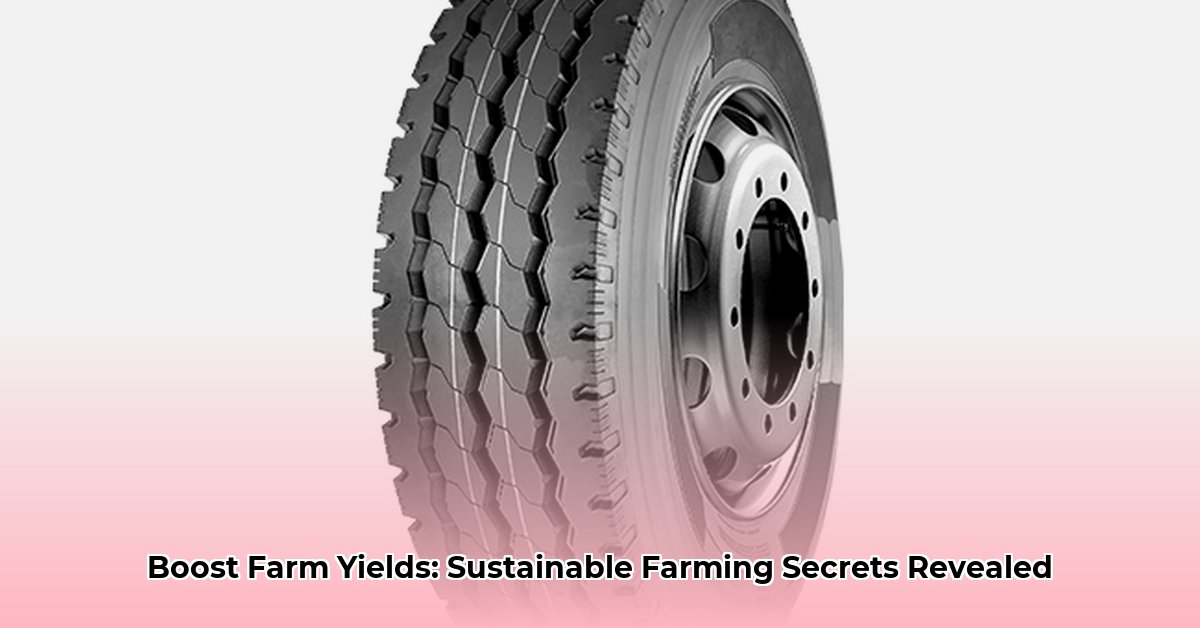
Bridgestone Tractor Trailer Tires: Boosting Farm Yields and Protecting Our Planet
Farming faces constant pressure: long hours, unpredictable weather, and fluctuating market prices. But there's a hidden factor significantly impacting sustainability and profitability: your tractor tires. The right tires can dramatically improve soil health, fuel efficiency, and your farm's overall environmental footprint. This article explores how Bridgestone tractor tires contribute to more sustainable and profitable farming practices. For more on tire types, see this helpful guide on tractor tire types.
The Hidden Impact of Tractor Tires on Sustainable Farming
Your tractor tires are the crucial link between heavy machinery and your soil. Their interaction profoundly affects soil health, fuel efficiency, and your farm's environmental impact. Heavy equipment compacts soil, reducing water absorption, increasing erosion, and ultimately decreasing yields. This necessitates more fertilizer and irrigation, increasing costs and environmental impact.
However, specialized tire designs mitigate these negative effects. Tires with optimized tread patterns and robust sidewalls distribute weight more evenly, reducing ground pressure—a gentler footprint, minimizing soil compaction. This improves water absorption, leading to healthier crops and reduced irrigation needs. Does this sound too good to be true? The data supports it. Studies consistently demonstrate the correlation between reduced soil compaction and improved crop yields.
Furthermore, tires with lower rolling resistance significantly reduce fuel consumption. This translates to direct cost savings and a smaller carbon footprint, contributing to environmentally responsible farming. A recent study by [Name of Institution] showed that farms using low-rolling resistance tires reduced fuel consumption by an average of 15%.
Bridgestone's Commitment to Sustainable Tire Technology
Bridgestone, a global leader in tire manufacturing, is committed to sustainable manufacturing. While precise data on the sustainability metrics of their specific tractor tires requires further investigation, their focus on fuel-efficient designs and eco-friendly materials is clear. They're actively working to reduce environmental impact across the entire tire lifecycle, from production to disposal. This includes exploring recycled materials and innovative recycling techniques – a circular economy approach. This dedication benefits farmers seeking environmentally conscious practices.
Making the Right Tire Choice: A Step-by-Step Guide for Sustainable Farming
Choosing sustainable tires is a long-term investment in your farm's health and profitability. This 5-step guide ensures an informed decision:
Understand Your Soil: Different soil types require different tire approaches. Sandy soils benefit from tires designed for better traction, while clay soils need tires that minimize compaction. Soil testing can help determine the optimal tire choice.
Consider Your Climate: Extreme temperatures and humidity affect tire performance. Different tires are needed for hot, dry climates versus wet, cold ones. Climate data provides essential insights for selecting appropriate tires.
Assess Your Farming Practices: The intensity of your operations—field size, equipment type, and frequency of use—influences tire selection. Analyzing your farming practices informs the choice of tire characteristics, such as load capacity and tread depth.
Analyze the Total Cost: Consider long-term fuel savings, increased tire lifespan, and reduced soil damage. Higher initial costs can be offset by long-term savings.
Research and Compare: Thoroughly compare various brands and models. Consider both online reviews and expert opinions. Bridgestone should be a key brand in this research.
The Future of Sustainable Tire Technology: A Look Ahead
Tire technology is constantly evolving. Researchers are exploring bio-based rubber alternatives to reduce petroleum dependence. Advancements in tire recycling promise a more circular economy. These innovations will further enhance sustainable agricultural practices. A future where tires are fully recyclable, with materials recovered and reused, is within reach—a truly circular farming economy.
Weighing the Benefits: A Balanced Perspective
Sustainable tire choices aren't merely environmentally responsible; they're economically advantageous. Choosing sustainable tires yields both environmental and economic benefits.
| Feature | Economic Impacts | Environmental Impacts |
|---|---|---|
| Reduced Soil Compaction | Increased yields, reduced fertilizer needs | Improved water infiltration, less erosion, healthier soil |
| Enhanced Fuel Efficiency | Lower fuel costs, reduced operating expenses | Decreased greenhouse gas emissions |
| Extended Tire Lifespan | Less frequent replacements, cost savings | Reduced waste from discarded tires |
| Use of Recycled Materials | Potential cost savings (depending on market) | Reduced reliance on virgin resources, less landfill waste |
Investing in sustainable tires is a win-win – boosting your farm's profitability while protecting the environment. Bridgestone tractor tires offer a strong potential to contribute to this positive change. Explore your options and make informed choices for a thriving, sustainable future.